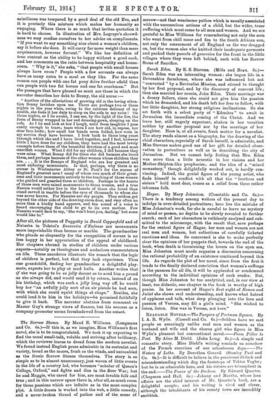Hagar. By Mary Johnston. (Constable and Co. 6s.)— There is
a tendency among writers of the present day to indulge in over-detailed portraiture; here lies the mistake of Mien Johnston's work, for she is careful to leave no mystery of mind or person, no depths to be slowly revealed to further search; each of her characters is ruthlessly analysed and sub- mitted to the microscope, with the result that, save perhaps for the central figure of Hagar, her men and women are not real men and women, but collections of carefully ticketed emotions and ideas. So concerned is she to make perfectly clear the opinions of her puppets that, towards the end of the book, when death is threatening the lovers on the open see., Miss Johnston must needs organize a discussion concerning the rational probability of an existence continued beyond this life. As regards the plot of her novel, since from the first it tends to the finally declared conviction that woman's suffrage is the panacea for all ills, it will be applauded or condemned according to the individual opinions of each reader. But, though Miss Johnston be too analytical, and, in our view at least, too didactic, one chapter in the book is worthy of high praise. In her account of Hagar's first sight of Romeo and Juliet she shows real understanding, and knows what hatred of applause and talk, what deep plunging into the love and passion of 'Verona, may fill a girl's mind. "She wished to listen, listen. She was in Verona, not here."














































 Previous page
Previous page